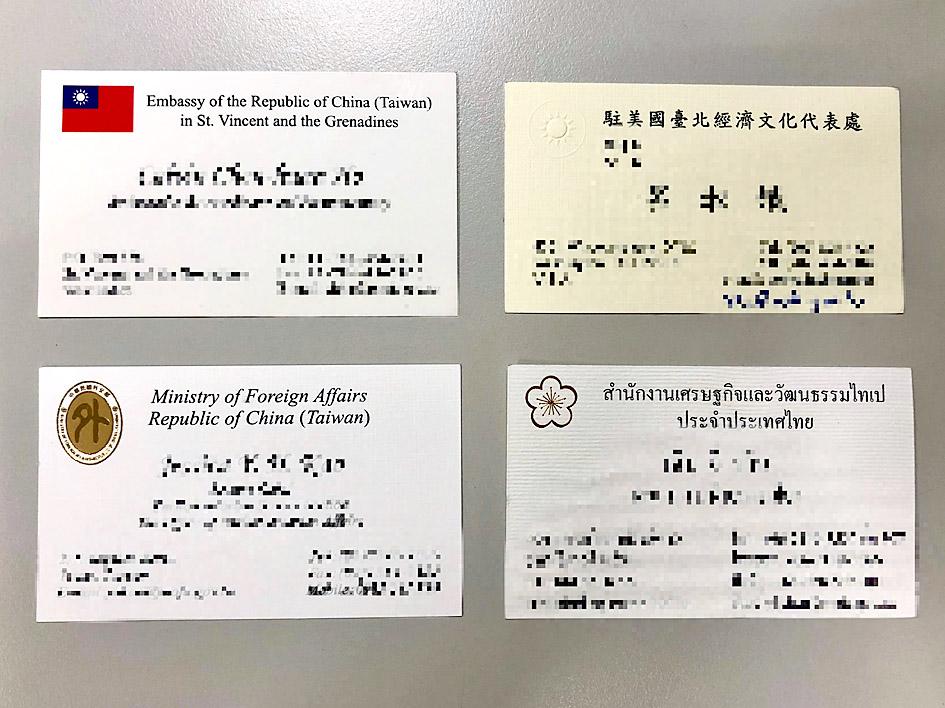The Ministry of Foreign Affairs (MOFA) yesterday denied media reports that it required embassies not to use “Taiwan” on staff name cards, saying the redesign of the cards has not been finalized.
The ministry on Friday last week notified embassies and consulate offices of new name card format standards, the Chinese-language Liberty Times (the Taipei Times’ sister paper) reported yesterday.
The notification, citing standards adopted in August 2011 during former president Ma Ying-jeou’s (馬英九) administration, listed the emblems for the card, without including the name of Taiwan.

Photo: Lu Yi-hsuan, Taipei Times
The move raised questions about whether the ministry was trying to force those who had added “Taiwan” to their cards to remove it, the paper reported.
The ministry has not required overseas officials to “correct” or not to use “Taiwan” on their cards, ministry spokeswoman Joanne Ou (歐江安) said yesterday.
The card standards have not been finalized and further interagency negotiations are required, she said.
The ministry had sent samples of the new designs “for reference,” as lawmakers have required that it unify the card formats, Ou said.
Existing practices, the varying situations in different countries, and highlighting Taiwan’s global recognition were factors being considered in the redesign, she said.
The nation’s formal documents for other countries — those with formal ties and some without — used “Republic of China (Taiwan)” as the nation’s name, she said.
For countries without formal ties or where the name Republic of China is not recognized, the nation’s representation is more flexible and depends on the attitude of those countries, she added.
The Executive Yuan also denied imposing any restrictions on the ministry’s use of “Taiwan” on diplomats’ name cards, adding that it would set up a task force to review the design of ministry’s cards and the cover of the nation’s passport, as well as a suggestion to rename China Airlines.
President Tsai Ing-wen (蔡英文) yesterday said that the “Taiwan” designation has been “quite commonplace” in the government’s diplomatic documents and has helped boost the nation’s visibility.
Representative to Germany Shieh Jhy-wey (謝志偉) on April 21 wrote on Facebook that Chinese Nationalist Party (KMT) Legislator Charles Chen (陳以信) had questioned the ministry about his name card, which reads “Reprasentant von Taiwan.”
Chen wrote on Facebook yesterday that what he meant to emphasize was that unifying name card formats is something the ministry should have done, and he had not demanded that the ministry remove references to Taiwan.
Democratic Progressive Party Legislator Wang Ting-yu (王定宇) wrote on Facebook that there is “too much China, too little Taiwan” in the ministry’s representation system.
The ministry should allow foreigners to differentiate between Taiwan and China and clearly embody the nation with a population of nearly 23.6 million people.
Additional reporting by Sean Lin

Chinese Nationalist Party (KMT) Chairman Eric Chu (朱立倫), spokeswoman Yang Chih-yu (楊智伃) and Legislator Hsieh Lung-chieh (謝龍介) would be summoned by police for questioning for leading an illegal assembly on Thursday evening last week, Minister of the Interior Liu Shyh-fang (劉世芳) said today. The three KMT officials led an assembly outside the Taipei City Prosecutors’ Office, a restricted area where public assembly is not allowed, protesting the questioning of several KMT staff and searches of KMT headquarters and offices in a recall petition forgery case. Chu, Yang and Hsieh are all suspected of contravening the Assembly and Parade Act (集會遊行法) by holding

PRAISE: Japanese visitor Takashi Kubota said the Taiwanese temple architecture images showcased in the AI Art Gallery were the most impressive displays he saw Taiwan does not have an official pavilion at the World Expo in Osaka, Japan, because of its diplomatic predicament, but the government-backed Tech World pavilion is drawing interest with its unique recreations of works by Taiwanese artists. The pavilion features an artificial intelligence (AI)-based art gallery showcasing works of famous Taiwanese artists from the Japanese colonial period using innovative technologies. Among its main simulated displays are Eastern gouache paintings by Chen Chin (陳進), Lin Yu-shan (林玉山) and Kuo Hsueh-hu (郭雪湖), who were the three young Taiwanese painters selected for the East Asian Painting exhibition in 1927. Gouache is a water-based

Taiwan would welcome the return of Honduras as a diplomatic ally if its next president decides to make such a move, Minister of Foreign Affairs Lin Chia-lung (林佳龍) said yesterday. “Of course, we would welcome Honduras if they want to restore diplomatic ties with Taiwan after their elections,” Lin said at a meeting of the legislature’s Foreign Affairs and National Defense Committee, when asked to comment on statements made by two of the three Honduran presidential candidates during the presidential campaign in the Central American country. Taiwan is paying close attention to the region as a whole in the wake of a

OFF-TARGET: More than 30,000 participants were expected to take part in the Games next month, but only 6,550 foreign and 19,400 Taiwanese athletes have registered Taipei city councilors yesterday blasted the organizers of next month’s World Masters Games over sudden timetable and venue changes, which they said have caused thousands of participants to back out of the international sporting event, among other organizational issues. They also cited visa delays and political interference by China as reasons many foreign athletes are requesting refunds for the event, to be held from May 17 to 30. Jointly organized by the Taipei and New Taipei City governments, the games have been rocked by numerous controversies since preparations began in 2020. Taipei City Councilor Lin Yen-feng (林延鳳) said yesterday that new measures by